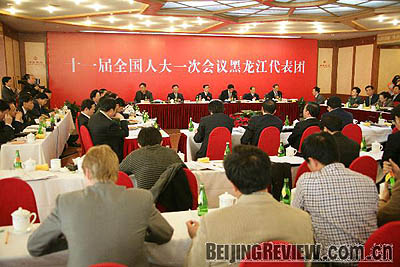|

Premier Wen Jiabao devoted much more space to economic issues when delivering this year's government work report at the opening meeting of the First Session of the 11th National People's Congress (NPC) on March 5, setting goals for economic development in 2008 and putting forward major tasks in order to reach the goals. At the NPC deputies' panel discussions on the report, issues related to economic development inevitably became hot topics. Whether high-ranking economists, local officials or grass-roots deputies--all offered their advice, though from different perspectives.
China's economic growth has been on the fast lane since 2003, with overheated investment, excessive credit and money supply growth, and an ever-increasing trade surplus. "I think the key problem is from overheated investment," said Lin Yifu, the World Bank's newly appointed chief economist and also a new NPC deputy from the Beijing delegation.
"Investment has grown fast and production has been boosted," said Lin. "Because domestic demand has been insufficient, the trade surplus has swelled, bringing in more and more foreign exchange reserves. To avoid fluctuations in renminbi exchange rate, China has had to increase its money supply and provide more loans. The oversupply of money and credit will facilitate investment again. Now we're in such a vicious cycle."
"We should use economic, legal and administrative measures to cool down overheated investment," said Lin.
"However, the in-depth reason behind the problem, I think, is inequitable income distribution," Lin continued.
Lin suggested that China should develop regional small and medium-sized banks to provide financing services to small and medium-sized enterprises (SMEs). With this, labor-intensive SMEs can create more job opportunities, low income groups can earn more, and the current inequitable income distribution pattern can be changed.
Lin said that investment and consumption will continue to rise, and energy product prices in the international market will remain at a high level.
"Under these circumstances, I totally agree that the government work report has set the target for this year's CPI growth at around 4.8 percent, and emphasized continuing to follow a tight monetary policy."
While adopting the tight monetary policy, we can have two choices, said Lin. One is instituting a more flexible interest rate policy and the other is raising the reserve requirement ratio.
"Both are important, but I myself suggest using the interest rate policy more," said Lin. With the CPI at a high level, interest rates will become negative if they aren't raised further. Money will flow to the stock market and real estate market, which is not beneficial for the healthy development of capital and property markets. SMEs can afford a higher interest because what they care about is not the interest rate, but whether they can get loans. However, the direct effect of raising the reserve requirement ratio is the reduction of credit. It'll become more difficult for SMEs to get loans.
"Under these conditions, the interest rate policy should be emphasized," Lin suggested.
Lin's advice on developing regional small and medium-sized banks to provide financing services to SMEs is to some extent echoed by Yuan Jinlin, Director of the Development and Reform Commission of northwest China's Ningxia Hui Autonomous Region.
Premier Wen's government work report says China will extensively promote the large-scale development of the western region. "But with the extensive implementation of this strategy and economic growth of Ningxia, rural areas in Ningxia increasingly demand financial services," Yuan told Beijing Review on the sidelines of their group discussion.
However, state-owned commercial banks are substantially cutting their outlets at the county level or below, shifting their business scope to large cities or large enterprises. "This resulted in the severe shrinkage of the financial system in rural areas," Yuan said. In some townships, there is not even one banking outlet. Ordinary people have no way to deposit their money, much less enjoy other financial services.
"I suggest that more financial services be provided while promoting the development of the western region," said Yuan.
Premier Wen's government work report specially mentioned that "the recent disaster resulting from snowstorms caused significant losses to China's economy…. We will continue the work of repairing the damaged facilities and minimizing losses from the disaster."
As a deputy from Tengtou Village of Fenghua, Zhejiang Province, Fu Qiping, Secretary of the CPC Tengtou Village Branch, showed his concern about the vulnerability of China's agriculture to natural disasters.
Fu described China's agricultural situation as "fragile." The month-long snowstorms that struck southern provinces early this year brought great losses to these regions, including Fu's hometown. "Only a limited amount of the loss can be covered by agricultural insurance," Fu said. "Most of the restoration work needs government subsidies."
Fu thought that the agricultural insurance market was in a Catch-22 situation: If the agriculture insurance rate is set by the market, farmers can't pay their premiums. Meanwhile, if the insurance rate is set at an affordable level for farmers, insurance companies won't have that much capacity to repay.
"Agricultural insurance could become a compulsory insurance, and the government should have more preferential policies and subsidies for it, so that natural disasters and market fluctuations that affect agricultural production can be reduced or avoided to the maximum," said Fu. | 